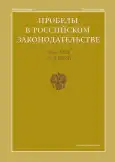Transparency of Justice and Information Technology
- Authors: Papysheva E.S.1
-
Affiliations:
- Ufa University of Science and Technology
- Issue: Vol 17, No 5 (2024)
- Pages: 85-93
- Section: Criminal Law Sciences
- URL: https://journal-vniispk.ru/2072-3164/article/view/265982
- DOI: https://doi.org/10.33693/2072-3164-2024-17-5-085-093
- EDN: https://elibrary.ru/JXRSPG
- ID: 265982
Cite item
Abstract
Digital technologies and artificial intelligence (hereinafter referred to as AI) are increasingly being applied in judicial proceedings in various countries. The technologization of judicial processes significantly enhances their efficiency. It is noted that the idea of integrating AI technologies into the Russian judicial system is currently only at the stage of conceptualizing the problem.
The author analyzes the issue of judicial transparency in relation to the opacity of AI. The benefits of using AI in automating judicial processes are considered: automated case distribution among judges, automatic minute-taking of court sessions, which fully records the course and results of proceedings, and online broadcasting of court sessions. These benefits correlate with judicial transparency, making justice more predictable, fair, consistent, understandable, and explainable. The need to "seal" AI in judicial processes from external (non-regulatory) influences with appropriate system certification is emphasized. Issues related to predictable law and the competitiveness of judges with AI are explored.
The problems of technologizing the domestic judicial system are noted, including the selection of judicial and other acts for subsequent machine learning, their digitization, as well as staffing for this activity, technical equipment, and funding.
The author concludes that the demand for integrating AI into the Russian judicial system should come from the state, represented by a qualified contracting authority.
Full Text
##article.viewOnOriginalSite##About the authors
Elena S. Papysheva
Ufa University of Science and Technology
Author for correspondence.
Email: papyshev-01@yandex.ru
ORCID iD: 0000-0001-8157-8805
Cand.Sci.(Law), Associate Professor, Institute of Law
Russian Federation, UfaReferences
- Bertovsky L.V. High-tech law: concept, genesis and prospects // Bulletin of the Peoples' Friendship University of Russia. Series: Legal Sciences. 2021. Vol. 25. No. 4. Pp. 735-749.
- Golovko L.V. The State and its Criminal Proceedings: Monograph. Moscow: Publishing House "Gorodets" 2022. 464 p.
- Eskaraev A.N. Welcoming speech. Proceedings of the International Scientific and Practical Conference "Artificial Intelligence and Big Data (BIG DATA) in the Judicial and Law Enforcement System: Realities and Requirements of the Time". Astana 2023. Pp. 13-14.
- Kartashov I.I., Kartashov I.I. Artificial intelligence: criminal-legal and procedural aspects // Actual problems of state and law. 2021. Vol. 5. No. 17 Substantive law. Pp. 75-88.
- Kolokolov N.A. "Electronic scales of justice" - our future // Russian judge. 2020. No. 11. Pp. 61–64.
- Maslov I. V. Review of the monograph by Doctor of Law, Professor Khanlar Dzhafarovich Alikperov “Electronic Technology for Determining Punishment” (“Electronic Scales of Justice”) // Russian Judge. 2020. No. 11. Pp. 55–60.
- Mergaliev A. Welcome speech. Proceedings of the International Scientific and Practical Conference “Artificial Intelligence and Big Data (BIG DATA) in the Judicial and Law Enforcement System: Realities and Requirements of the Time”. Astana 2023. Pp. 7–9.
- Momotov V. V. Legal Proceedings in Russia in the Context of New Digital Technologies. Proceedings of the International Scientific and Practical Conference “Artificial Intelligence and Big Data (BIG DATA) in the Judicial and Law Enforcement System: Realities and Requirements of the Time”. Astana 2023. Pp. 267–271.
- Papysheva E.S. Artificial Intelligence and Principles of Criminal Procedure: Compatibility Issues // Gaps in Russian Legislation. 2022. No. 5. Pp. 430-436 doi: 10.33693/2072-3164-2022-15-5-430-436.
- Papysheva E.S. Limits of Admissibility of Participation of Artificial Intelligence in Sentencing // Gaps in Russian Legislation. No. 5 2023. Pp. 386-392 doi: 10.33693/2072-3164-2023-16-5-386-391.
- Polyakov M.P. Evidence and Digital Writing in Criminal Procedure: Expecting Magic. Bulletin of the Nizhny Novgorod Academy of the Ministry of Internal Affairs of Russia. 2020. No. 1 (49). P. 229-231.
- Polyakov. S.B. Our opinion: only artificial intelligence will force the judge to be fair // Bulletin of the Moscow University of the Ministry of Internal Affairs of Russia. 2021 No. 3. P. 213-218.
- Polyakov S.B., Gilev I.A. Words and deeds of the "digitalization of rights" // Russian Law Journal. 2023. No. 1 (148). P. 85-96.
- Salikhov Z.M., Bagautdinov F.N. Automated distribution of criminal cases in court: work and problems of the Criminal Procedure system. 2020, No. 6. P.84-90.
- Kharitonova Yu.S., Yan T. Legal problems of transformation of the basic principles of justice in the context of digitalization of the civil process in Russia and China // Bulletin of civil procedure, 2023 No. 1 ConsultantPlus.
- Tsvetkov Yu.A. Artificial intelligence in justice // Law, 2021 No. 4; P.91-107 Consultant Plus.
- Finder, S. (2019). China's Translucent Judicial Transparency. J. Comp. L., 14, 222.
- Grimmelikhuijsen, S., & Klijn, A. (2015). The effects of judicial transparency on public trust: Evidence from a field experiment. Public Administration, 93(4), 995-1011.
Supplementary files








